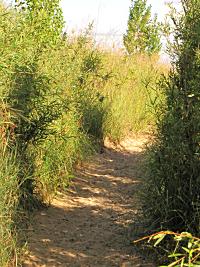|
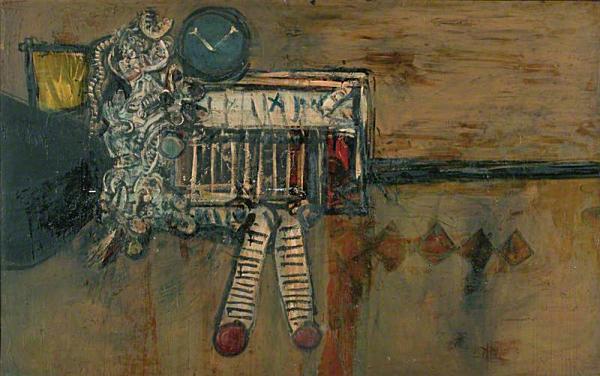
White Magician
1979
Alan Davie
1920 - 2014
_______________________
The Straitening
Paul Celan
translation by Michael Hamburger
(....)
*
Nowhere
does anyone ask after you -
The place where they lay, it has
a name - it has
none. They did not lie there. Something
lay between them. They
did not see through it.
Did not see, no,
spoke of
words. None
awoke,
sleep
came over them.
(....)
*
Go
to the eye,
the moist one -
Gales.
Gales, from the beginning of time,
whirl of particles, the other,
you
know it, though, we
read it in the book, was
opinion.
Was, was
opinion. How
did we touch
each other - each other with
these
hands?
There was written too, that.
Where? We
put a silence over it,
stilled with poison, great,
a
green
silence, a sepal, an
idea of vegetation attached to it -
green, yes,
attached, yes,
under a crafty
sky.
Of, yes,
vegetation.
Yes.
Gales, whirl of part-
icles, there was
time left, time
to try it out with the stone - it
was hospitable, it
did not cut in. How
lucky we were:
Grainy,
grainy and stringy. Stalky,
dense:
grapy and radiant; kidneyish,
flattish and
lumpy; loose, tang-
led -; he, it
did not cut in, it
spoke,
willingly spoke to dry eyes, before closing them.
Spoke, spoke.
Was, was.
We
would not let go, stood
in the midst, a
porous edifice, and
it came.
Came at us, came
through us, patched
invisibly, patched
away at the last membrane
and
the world, a millicrystal,
shot up, shot up.
*
...(more)
_______________________
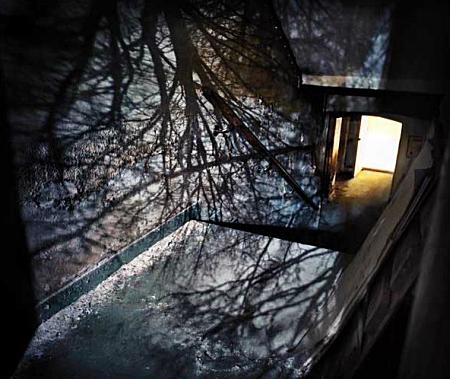
Speaking House
Marja Pirilä
via Books from Finland
_______________________
Handke and Singularity
Karl Ove Knausgaard
(....)
The Straightening is a lament for that which was lost forever, but it is also the opposite: a beginning, since it in itself was created, not destroyed. And since it in itself communicates, it establishes a new ‘we’ which every new reader redeems. And although our own time is radically different, the abyss between language and the world is the same and the duplicity of language just as treacherous. It is still through language that the world is created and we are connected to it, yet language is also what distances us from it. Language is still coercion, a mass system of conformity and socialisation that erases the individual, yet it is only through language that we can express individuality, the separate, the unique. One of the best and most important books written in German in our time is – to my mind – Peter Handke’s A Sorrow Beyond Dreams [Wunschloses Unglück] from 1972. The problem of representation is also a key issue here, though it is presented in a very different way. The book is autobiographical in the sense that it is based on an actual event in Handke’s life: his mother’s suicide. The prose is sparse and subdued; in other words, not novelistic, which in turn means unbeautiful, perhaps because beauty instils hope, and this is a novel about despair. Beauty, that is, the literary filter through which the world is viewed, gives hope to despair, value to worthlessness, and sense to meaningless. It is inevitably so. Loneliness that is beautifully described lifts the soul to new heights, and then it is no longer true; for loneliness is not beautiful, despair is not beautiful, not even longing is beautiful. It is not true, but it is good. It is a comfort, it is a relief, and perhaps it is where some of literature’s justification lies? But in that case, it is literature as something else, as something special and autonomous, something valuable in itself – not as a representation of reality. That is something Peter Handke tries to evade in his novel.
It was written a few weeks after the funeral, and in it Handke tries to see his mother and her life in as true a light as possible. Not true in the sense that it really happened – she was a real person in the world – but true in his insight and in the way he imparts this insight. He does not represent his mother in the text; that (I felt when reading it) would be a violation of her as a human being. She was her own person, lived her own life, and instead of depicting that life, Handke refers to it, like something that lies outside the text, never inside it. This means that he writes in general terms, about the contexts in which she figured, about the roles she assumed or did not assume, but these generalities can also present problems, he writes, because they can become independent of her and take on a life of their own in the text through his poetic formulations – which would also be a betrayal of her. He writes: “Consequently, I first took the facts as my starting point and looked for ways of formulating them. But I soon noticed that in looking for formulations I was moving away from the facts. I then adopted a new approach – starting not with the facts but with the already available formulations, the linguistic deposit of man’s social experience.” That is where he searches, as it were, for his mother’s life. He does this to protect her dignity and integrity, as far as I can understand, but then something else also happens in the text: when a person is portrayed through the eyes of her contemporary society, through its culture and self-understanding, through its roles and limits, her inner nature disappears, her individual and characteristic existence, what used to be referred to as the soul, and – I think – perhaps Handke’s book is also a story of precisely that: society’s oppression of the individual, the strangling of the soul.
...(more)
via Mark Thwaite
_______________________
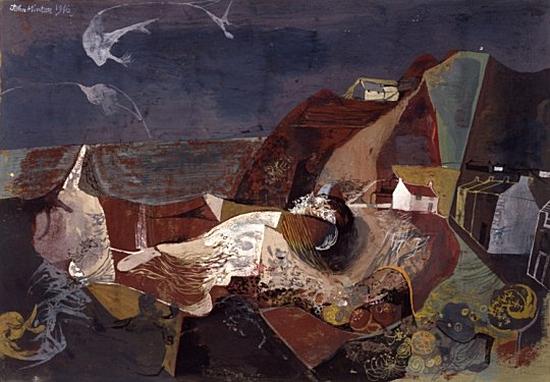 Stormy Day, Cornwall
1946
John Minton
(1917 – 1957)
_______________________
The Wind Sleepers
H. D.
1886 - 1961
Whiter
than the crust
left by the tide,
we are stung by the hurled sand
and the broken shells.
We no longer sleep
in the wind—
we awoke and fled
through the city gate.
Tear—
tear us an altar,
tug at the cliff-boulders,
pile them with the rough stones—
we no longer
sleep in the wind,
propitiate us.
Chant in a wail
that never halts,
pace a circle and pay tribute
with a song.
When the roar of a dropped wave
breaks into it,
pour meted words
of sea-hawks and gulls
and sea-birds that cry
discords.
_______________________
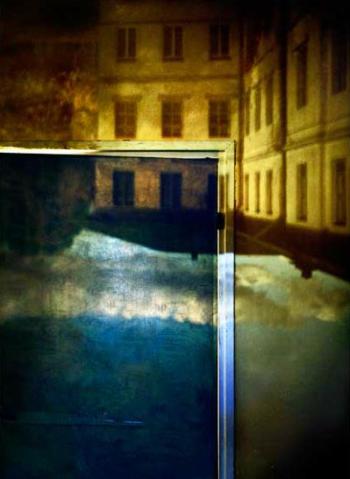
Speaking House
Marja Pirilä
_______________________
On the evenings of April 23–25, 2010, New York-based theater collective Group Theory probed the psychosonic landscapes of Herman Melville’s classic novella Bartleby, the Scrivener in an intimate chamber ritual that transforms the private act of reading into a communal encounter. A strange literary-theatrical hybrid, Bartleby. A Rereading is a palimpsest of readings, a hyper-lucid window onto a famously difficult text in all its haunting ambiguity and violent comedy. Each performance was followed by drinks and conversation with invited respondents, including Paul Chan, Edwin Frank, Lynne Tillman, Abha Dawesar, John Bryant, Vivian Gornick, Joseph McElroy, Alice Boone, Graham Parker, Molly Springfield, McKenzie Wark, and Greg Wayne. Below are condensed and edited excerpts from those three conversations, recently published in Invalid Format: An Anthology of Triple Canopy, Volume 3.
The Scrivener’s Business
by Triple Canopy
VIVIAN GORNICK
This is the greatness of rereading when you’re many years older: You are a different person. And so I’m shocked and thrilled to read the Bartleby that I read this week. When I was a kid I couldn’t get past the mysteriousness. This time I thought, at first, Bartleby is the lawyer’s story; but in time I realized it’s about the dynamic between Bartleby and the lawyer. The lawyer is not deceiving himself, but he only knows partially what he does, and what he thinks, and how he thinks; Melville brilliantly shows you the degree to which the lawyer understands what he’s thinking about and the degree to which he doesn’t. The lawyer is the essence of the Upper West Side liberal. [Laughter.]
What is Bartleby? He’s not real, none of them are real—they’re postures, they’re attitudes, ways of being in the world. All the lawyer wants is for Bartleby to be reasonable. This is the essence of what Bartleby cannot be. Bartleby is that which is not reasonable. Now, I say to you, if the lawyer was a radical, not a liberal, he would have gone the extra mile. He would have kept Bartleby no matter what. He would have known that Bartleby is the essence of rebellion, of the refusenik, of “I won’t live on your terms,” of “in fact I’m not even sure if I want to live on any terms.”
...(more)
_______________________

Cornish Church
1969
Sir Matthew Smith
1879 -1959
_______________________
Cry Isis
Maniza Naqvi
3 quarks daily
Offspring of wanton wants, they arrive, together, these gods of war and weather, to the beating drums, and sound of thunder, crying out crisis, each September. This century's, Septembers, all arrive back to school, as it were, refreshed from resorts and beaches, in need of replenishing, their depleted coffers, of personal savings, and future job offers.This century's, September, as if afraid of endings, arrives as though, its own immortal endless season, of unceasing sameness, an eerie stillness of repeated scripts and finite possibility: War as weather and weather as war. Each September, reminds us, of an, unchanging, unreformed industry, of needs, that guarantees, more spectacular bombs and thunderous storms. Bombs and storms. Lovingly named for eradicated tribes, victims of genocide, and of course women. Apache Helicopters, and Tomahawk missiles, Rita, Katrina, and Ophelia. Do you even remember, come September, as we lurch from one year to the next, all the threats and crisis, these Septembers past have presented as pretexts? ...(more)
_______________________
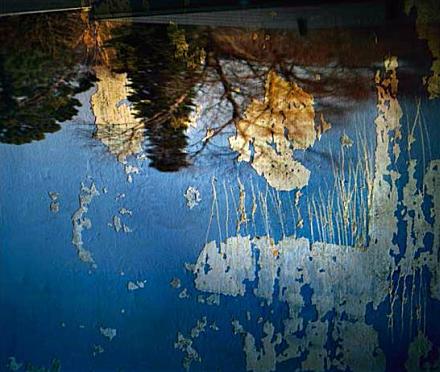 Speaking House
Marja Pirilä
_______________________
A Voice Full of Cities: The Collected Essays of Robert Kelly
edited by Pierre Joris & Peter Cockelbergh (Contra Mundum Press, 2014)
... As Guy Davenport wrote: “A Kelly poem is a Kelly poem. It dances in his way, sings in his intonations, insisting on its style. No American poet except perhaps Wallace Stevens has his sense of balance in a line. [...] Kelly has nothing to hide: the untiltable balance is there to begin with.”
Less visible than the poetry, but certainly no less important, incisive, worth preserving & circulating anew, are the trove of essayistic materials disseminated throughout numerous small & not so small magazines of the second-half of the 20th C and beyond. The out-of-print 1971 In Time was Kelly’s sole published book of essays properly speaking, even though he has been writing on his (& others’) poetry & poetics since the early 60s.
Long over-due, the present volume, A Voice Full of Cities, collects for the first time Kelly’s essays, statements, & other writings on poetry & poetics, making available a vast array of difficult to obtain works. The editors’ aim was to insure that — in Robert Kelly’s own words — “the fifty years of thinking around the fifty years of making won’t get lost, and making and thinking will be seen as one thing.”
Pierre Joris
_______________________
Celebrating ten years of This Space
Thanks and congratulations Stephen
Stephen Mitchelmore interviewed by Mark Thwaite
_______________________
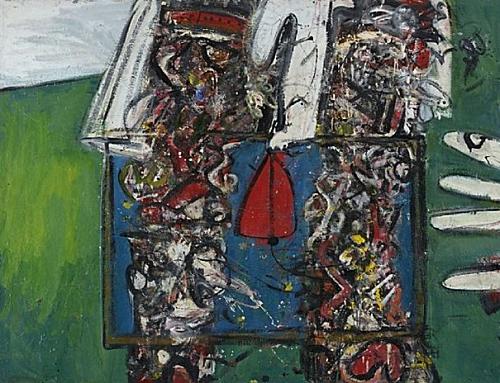
Philosopher’s Stone
Alan Davie
1957
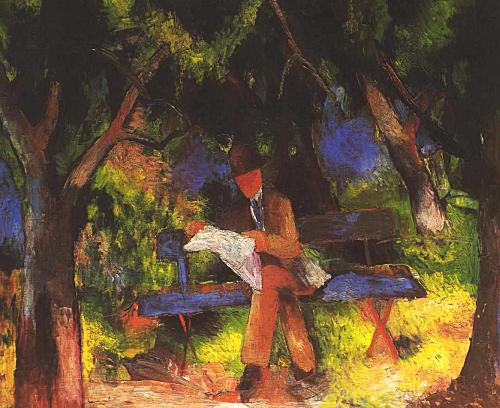
Reading man in park
1914
August Macke
d. September 26, 1914
_______________________
Olson / Williams
John Latta
Intent of the offertory: a benign osculatory (or oscillatory) mayhem, knowledge made up out of a effervescence of gatherings (“haunte floures by cause of gadrynge of hony”). A gestural sup.
(....)
Olson, out of Call Me Ishmael (1947):
I take SPACE to be the central fact to man born in America, from Folsom cave to now. I spell it large because it comes large here. Large, and without mercy.
It is geography at bottom, a hell of wide land from the beginning. . . .
~
And there’s William Carlos Williams, out of In the American Grain (1925), the chapter titled “Descent” with its terrifying (and defiant) talk of “sinking” and “ground” (in the figure of Sam Houston who, in sumptuous recoil against loss, “took the descent once more, to the ground”). Turning to American writers:
. . . Poe can be understood only in a knowledge of his deep roots. The quality of the flower will then be seen to be normal, in all its tortured spirituosity and paleness, a desert flower with roots under the sand of his day.
Whitman had to come from under. All have to come from under and through a dead layer.
But this primitive ordeal, created by a peculiar condition of destiny (the implantation of an already partly cultured race on a wild continent) has a plant in its purpose, in its lusts’ eye, as gorgeous as Montezuma’s gardens of birds, wild beasts and albino natives in wooden cages.
But he who will grow from that basis must sink first.
If he goes to France, it is not to learn a do re mi fa sol. He goes to see a strange New World.
If not definitely a culture new in every part, at least a satisfaction. He wants to have the feet of his understanding on the ground, his ground, the ground, the only ground that he knows, that which is under his feet. I speak of aesthetic satisfaction. This want, in America, can only be filled by knowledge, a poetic knowledge, of that ground. Since this is difficult, due to the hardships which beset the emergence of a poet: A poet is one related to a basis of aesthetic, spiritual, hypothetical, abnormal—satisfaction, . . . since this is so, the want goes for the most part unsatisfied in America or is satisfied by a fillgap. The predominant picture of America is a land aesthetically satisfied by temporary fillgaps . . .
...(more)
Wonderful to find John Latta posting again at Isola Di Rifiuti
_______________________
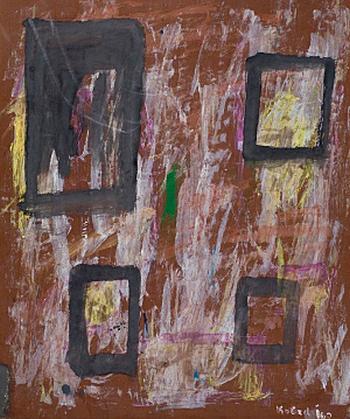
The composition of squares
1960
Aleksander Kobzdej
d. September 25, 1973
_______________________
Night Sky Drones
Arthur and Marilouise Kroker
ctheory
When the Sky Grew a Warlike Eye
More than ever, real power in the twenty-first century is space-bound--globalized, atmospheric, instantaneous. It is not that time has disappeared, but that the medium of time itself has been everywhere reduced, reconfigured, and subordinated to the language of spatialization. That is the meaning of "real-time" as part of the contemporary language of power--time itself as an otherwise empty, locative coordinate in the spatial networks of communication surrounding us. But if that is the case, if, indeed, power has taken to the air, literally taken flight with the technological capacity provided by drones to turn the sky into a warlike eye, that would also indicate that the grasp of power on the time of duration, the lived time of territorial and bodily inscription, has perhaps been terminally weakened. When the sky has been transformed into a liquid eye of power--monitoring, watching, archiving visual data for storage in distant archives--with target acquisition and weaponized drone strikes as its military tools of choice, the greater complexity and intricate materialism of time escapes its grasp.
Think perhaps of a distant future when empires, following the usual cycle of rise and decay, crumble to dusty memories, when a collapsed social economy produces an angry mass of dispossessed citizens in the otherwise empty streets, when even borders are abandoned in the global rush for scarce resources, and when all that is likely to be left may be those airborne fleets of now fully automated drones, long forgotten by their ground command, but still, for all that, circling the sky on the hunt for humans. At that point, some historian of the technological past may well begin to reflect on what exactly was released in the domestic atmosphere when the drones came home: a technologically augmented surveillance system under strict political supervision, or something different. That is, the giving of sky life to a new species of being--being drone--with a score to settle against its human inventors and, over time, the capabilities to do something about it. In this time, above all times, a time in which we can finally appreciate what is to be gained and lost--what is utopian and what dystopian--concerning the technological devices we have engineered into existence, it may be well to remember that the story of technology has never really lost its entanglement with questions of religion, mythology, and politics.
Signs of the practical entwinement of technology and mythology are everywhere now as early warnings of what is yet to come--namely, that while the contemporary language of technology might have excluded its origins in myths of nemesis and hubris, what drone technology may actually deliver in the future as its most terminal payload will be the return of mythic destiny as the hauntology of the sublime order of technology. Consider, for example, the following stories about the world of drone warfare: "Drone Kamikazes in the California Sun" and "Hydra Awakened."
...(more)
_______________________
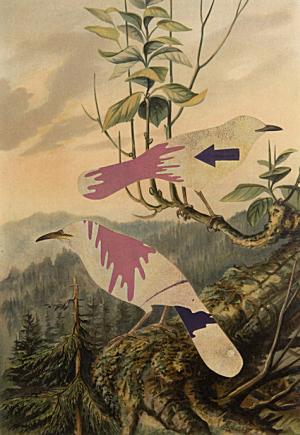
JirÍ Kolár
b. September 24, 1914
_______________________
quotes from
The Falling Rate of Learning and the Neoliberal Endgame
David J. Blacker
spurious
(....)
It should now be clear to everyone that neoliberal education policy is not about reforming public schools. It is about obliterating any remaining vestiges of the public square via a market discipline that is officially supposed to apply to everyone but in reality is selectively applied only to those lacking sufficient wealth to commandeer state policy; ironically the sacred market applies to public schools not to megabanks. It is in essence the strategy of the gated community, where those at the top 'have theirs' and withdraw from the educational commons and into their state-backed corporatist enclaves. Our elite capitains are abandoning the public educational ship in whose hold lie nearly 90% of US school children. [...]
The newer kind of non-recognition involves not merely reducing people to means but simply wishing them away and ignoring them altogether; in this way at the level of the concern for the Other, we are transforming from abuse to neglect. An increasing proportion of humanity - in the global South but also here at home - grows non-exploitable economically. Their labour is incapable of importing enough value to render them serviceable for traditional capitalist production and so they are economically 'out of the loop'[...] They have become 'extra people' and superfluous. At best their realtion to the formal economy is occasional and precarious as evidence by the stunning growth of those living most of their lives in what anthropologist Keith Hart desceribes as 'the informal economy', living, for example, under subsistence conditions of 'forced entrepreneurship' such as prostitution or the selling of odds and ends. They are the disposable ones[...] Their main productive function now is to serve as part of a disciplinary warning to precarious remaining workers that 'but for the grace of the (job)Creator, there go I'. [...]
...(more)
_______________________
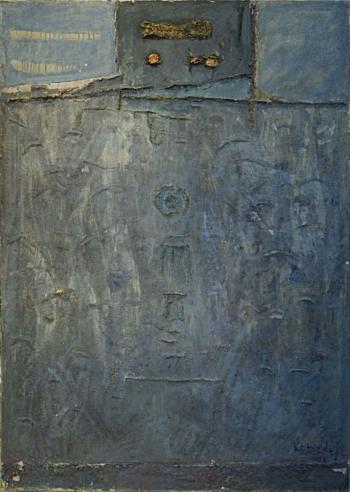 dusk
Aleksander Kobzdej
1956
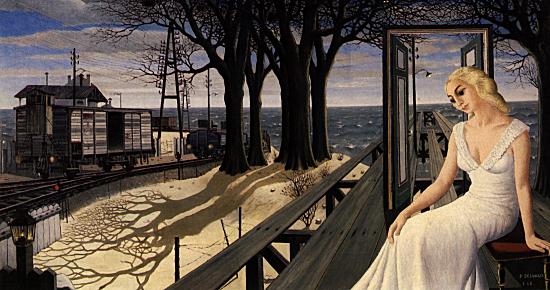
Les Ombres
Paul Delvaux
b. September 23, 1897
_______________________
Radical Linguistics in an Age of Extinction
Ross Perlin
. . . words are a way of fending in the world: whole languages, like species, can disappear without dropping a gram of earth weight, and symbolic systems to a fare you well can be added without filling a ditch or thimble. . . .
—A.R. Ammons
(....)
Equality, diversity, respect for orality, descriptivism (not prescriptivism), and “going to the people”: these remain fundamental tenets for any program of radical linguistics, and for anyone who cares about human language. But today there are sobering realities. The concept of linguistic equality has done little to change popular perceptions. Nor have two centuries of revolutionary political and social movements, though certain large-enough languages have been elevated to official status in the course of national liberation struggles. Nearly everywhere, a persistent stigma clings to minority languages, provincial dialects, “non-standard” accents, and working-class “sociolects,” not to mention the linguistic registers used by women, young people, and LGBTQ speakers. The vitriol routinely trained on Black English in America is representative, although politically committed linguists like William Labov and John Rickford have devoted their careers to documenting and defending its integrity. Debates about language are rarely just about language—they’re always about the speakers.
(....)
In the early 1990s, a small subset of linguists began raising the alarm, trying to reorient a discipline whose well-meaning focus on elusive and trivial “universals” had led it to ignore actually existing linguistic diversity—an unfortunate legacy left by Noam Chomsky, who was a radical and a linguist but not a radical linguist.
(....)
Leftists, liberals, and progressives have a bigger stake in the future of language than they know. We hardly realize how deeply embedded capitalist mentalities now are in our very language—the ways we talk about time, space, relationships. Liberals intensely aware of privilege based on gender, race, class, or sexuality seldom consider linguistic privilege—English (or Spanish or Chinese or Hausa) is just the air we breathe. The politics of language, when we practice it at all, has been about framing, about keywords, about sloganeering in the major languages. Meanwhile, the ground is shifting under us.
...(more)
_______________________
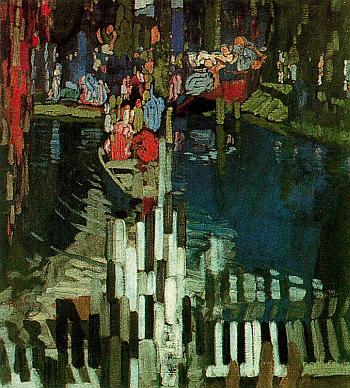
Piano Keys Lake
1905
Frantisek Kupka
b. September 23, 1871
_______________________
We’ve All Always Been Lichens: Donna Haraway, the Cthulhucene, and the Capitalocene
Leif Haven
entropy
(....)
The Cthulhucene. Haraway approaches a definition of the cthonic epoch by talking about the impossibility of existing as an individual – existing is far stranger than a bunch of monads wandering around and interacting. No, this epoch is defined by the frightening weirdness of being impossibly bound up with other organisms. She says, “complexity is impossible without infection.” This recalls Tim Morton’s concept of the “strange stranger.” Even the self is infinitely strange. The identity of an individual is amorphous, porous, and liminal. There’s never a clear point at which a being begins or ends, and that’s why we are all lichens: a being made up of multiple separate symbiotic organisms.
Haraway says, “The activation of the chthonic powers that is within our grasp to collect up the trash of the anthropocene, and the exterminism of the capitalocene, to something that might possibly have a chance of ongoing.”
What might this mean or be?...(more)
"Anthropocene, Capitalocene, Chthulucene: Staying with the Trouble"Donna Haraway vimeo
Sympoiesis, not autopoiesis, threads the string figure game played by Terran critters. Always many-stranded, SF is spun from science fact, speculative fabulation, science fiction, and, in French, soin de ficelles (care of/for the threads). The sciences of the mid-20th-century "new evolutionary synthesis" shaped approaches to human-induced mass extinctions and reworldings later named the Anthropocene. Rooted in units and relations, especially competitive relations, these sciences have a hard time with three key biological domains: embryology and development, symbiosis and collaborative entanglements, and the vast worlds of microbes. Approaches tuned to "multi-species becoming with" better sustain us in staying with the trouble on Terra. An emerging "new new synthesis" in trans-disciplinary biologies and arts proposes string figures tying together human and nonhuman ecologies, evolution, development, history, technology, and more. Corals, microbes, robotic and fleshly geese, artists, and scientists are the dramatis personae in this talk's SF game.
_______________________
Anarchism
larval subjects
(....)
My thesis is that anarchism is the form of political organization that haunts all politics. However, this formula is liable to misinterpretation. “Haunting” generally has negative connotations. Someone might therefore take this statement to denote the idea that anarchism is a danger that threatens all forms of political organization. Under this characterization, anarchy would be something to be defended against.
This is not what I mean when I say anarchy haunts all forms of social and political organization. Rather, I mean something closer to Marx’s claim that communism is a specter that haunts Europe. To my thinking, anarchism haunts all political thought and all actually existing political institutions in two ways: First, there is the positive way. Anarchism is the political ideal– recognized as such or not –that all emancipatory politics aspires to. All truly just political organization strives to be egalitarian and without hierarchy, whether hierarchy be organized around a privileged leader, economic class, privileged institutions (such as corporations or parties), a privileged gender, ethnicity, religion, etc. When we think the concept of emancipation to its logical conclusion, anarchism stares back at us. Anarchism is what emancipatory and egalitarian politics strives to be without being it. It is the regulative ideal that both functions as the aim this politics strives towards and the standard it falls short of.
...(more)
_______________________
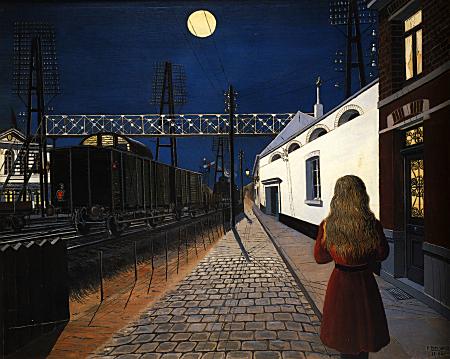
Solitude
Paul Delvaux
1956
_______________________
The Anxious Middle: Wittgenstein Jr Reviewed
Will Rees
the quietus
Some books ask that you take them seriously, erasing everything comic, positioning themselves above the world. Others seek to make you laugh, erasing everything serious, positioning themselves beneath the world. There is a third category, much rarer. These books operate in a space where such distinctions are no longer possible: from an anxious—not a golden—middle. Where the laughable and the serious remain, mutually protecting one another; where they do not merge and yet are impossible to distinguish. We laugh, but that laughter remains caught in our throat. Such books are deadly serious.
(....)
An aesthetic is emerging from Iyer’s work over the last few years, one that’s surprisingly consistent: rigorously anti-beautifying, anti-kitsch and yet, for all its cynicism, quietly optimistic.
Readers of his trilogy will find that Iyer’s style remains largely unchanged. For the most part this is welcome, though I wonder if a less fragmented approach might have worked better when treating the character of Wittgenstein. If Bernhard’s magic works by a sheer accumulation of terms—opacity exuding from an excessive paroxystic communicativeness; words piling up until the unspoken rears its head—Iyer’s disrupting of Wittgenstein’s monologues at key moments sometimes has a deflationary effect, can give them the finality of a well told joke.
(....)
Wittgenstein Jr walks a line between cynicism and optimism, between the laughable and the serious; it’s a line too fine to be easily called. Whether it fall down on one side, or remains in the anxious middle, will depend on how much the book makes you laugh, and what kind of laughter that is. I, for my part, found it hilarious.
...(more)
Wittgenstein Jr
Lars Iyer melville house
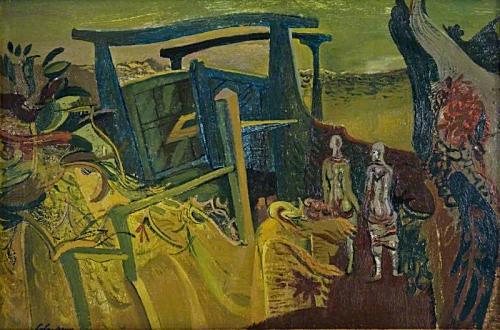
The Lock Gate
1942
Robert Colquhoun
1914-1962
_______________________
A Drunk Man Looks at the Thistle
Hugh MacDiarmid
full text
PART 2
The munelicht's like a lookin-glass,
The thistle's like mysel,
But whaur ye've gane, my bonnie lass,
Is mair than I can tell.
Were you a vision o mysel,
Transmutted by the mellow liquor?
Neist time I I glisk you in a glass,
I'se warrant I'll mak siccar.
A man's a clean contrairy sicht,
Turned this way in-ootside,
And, fegs, I feel like Dr. Jekyll
Tak'n guid tent o Mr. Hyde...
Gurly thistle - hic - you canna
Daunton me wi your shaggy mien,
I'm sair - hic - needin a shave,
That's plainly to be seen.
But what aboot it - hic - aboot it?
Mony a man's been that afore.
It's no a fact that in his lugs
A wund like this need roar!...
(....)
There's nocht sae sober as a man blin drunk.
I maun hae goat an unco bellyfu'
To jaw like this - and yet what I am sayin
Is aa the apter, aiblins, to be true.
This munelicht's fell like whisky noo I see't.
- Am I a thingum mebbe that is kept
Preserved in spirits in a muckle bottle
Lang centuries efter sin wi Jean I slept?
- Mounted on a hillside, wi the thistles
And bracken for verisimilitude.
Like a stuffed bird on metal like a brainch,
Or like a sea on a trump o rock-like wood?
Or am I juist a figure in a scene
O Scottish life A.D. one-nine-two-five?
The haill thing kelters like a theater claith
Till I micht fancy that I was alive !
I dinna ken and nae man ever can
I micht be in my ain bed efter aa.
The haill damned thin's a dream for ocht we ken,
- The Warld and Life and Daith, Heaven, hell anaa.
We maun juist tak things as we find them then,
And mak a kirk o mill o tham as we can,
- And yet I feel this muckle thistle staunin
Aatween me and the mune as pairt o a Plan.
It isna there - nor me - by accident.
We're brocht the gaither for a certian reason,
Ev'n gin it's naething mair than juist to gie
My jaded soul a necessary frisson.
I never saw afore a thistle quite
Sae intimatley, or at sic an oor.
There's something in the fickle licht that gi'es.
A different life to't and unco pooer.
...(more)
Hugh MacDiarmid reads A Drunk Man Looks at the Thistleyoutube
_______________________
Reminiscences of Scottish life and character
Dean Ramsey
(1908)
Community Texts
_______________________
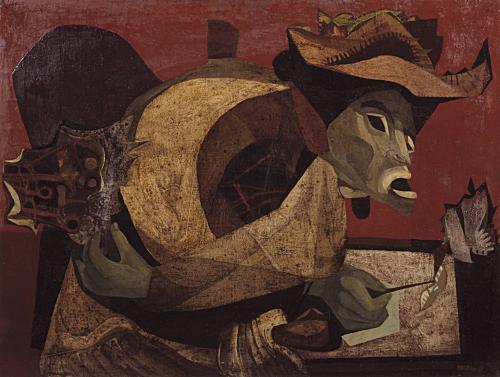
Woman with Paper Flowers
1944
Robert MacBryde
1913 - 1966
_______________________
Nomos of the Earth: Original Instructions
(....)We are living through a catastrophe unprecedented in human history in which what we’ve lost is the world. We have to face that, but we have to face up to the reality that we have also been set free by this devastation that, with a thousand voices, declares itself an expired way of life, “the abandoned ruin of a dead civilization.” There is nothing to cry for anymore. There is no use clinging to a future we were promised, which will never come anyway. There is, equally, nothing left to critique, to be outraged or indig- nant about. It is just our time, our epoch, and there is only us, here, and now. Only the decisions we make here, now. If we accept that, the question becomes acting in a way that is adequate to the situa- tion we face. Adequate to history, to our shared, historical, revolutionary task. The door is open. Walk through it.
(....) via Forgottenness
_______________________

Backgammon Player
Robert MacBryde
1947
_______________________
from Symphony No.11
…the inner recesses… (for Mary)
I
This flesh breathes
expands and contracts
divining a place in the universe
outside the door’s lifeless shadow
the grey strata of clouds
rising in the east
and to touch this residue
which clots the morning dawn
an ink’s pooling Rorschach design
a panther of retracting night
shrouded in the forest
waking to wind through alcove windows
to plainchant echoes from atonal dreams
II
There is a point of beginning
of abstract generalities
of the solitary heart
amid an intermittent rain
of the stranger’s glare
in a room
where the doorway swings closed
and where the fate of Schrodinger’s cat
depends upon eyes observing
the degeneration of atomic nuclei
and the silent sentience
of forgotten lives
left on the cutting-room floor
...(more)
E·ratio 19 · 2014
_______________________

Woman with Leaping Cat
Robert Colquhoun
1945
_______________________
Why Walking Helps Us Think
Ferris Jabr
newyorker
In Vogue’s 1969 Christmas issue, Vladimir Nabokov offered some advice for teaching James Joyce’s “Ulysses”: “Instead of perpetuating the pretentious nonsense of Homeric, chromatic, and visceral chapter headings, instructors should prepare maps of Dublin with Bloom’s and Stephen’s intertwining itineraries clearly traced.” He drew a charming one himself. Several decades later, a Boston College English professor named Joseph Nugent and his colleagues put together an annotated Google map that shadows Stephen Dedalus and Leopold Bloom step by step. The Virginia Woolf Society of Great Britain, as well as students at the Georgia Institute of Technology, have similarly reconstructed the paths of the London amblers in “Mrs. Dalloway.”
Such maps clarify how much these novels depend on a curious link between mind and feet. Joyce and Woolf were writers who transformed the quicksilver of consciousness into paper and ink. To accomplish this, they sent characters on walks about town. As Mrs. Dalloway walks, she does not merely perceive the city around her. Rather, she dips in and out of her past, remolding London into a highly textured mental landscape, “making it up, building it round one, tumbling it, creating it every moment afresh.”
Since at least the time of peripatetic Greek philosophers, many other writers have discovered a deep, intuitive connection between walking, thinking, and writing. ...(more)
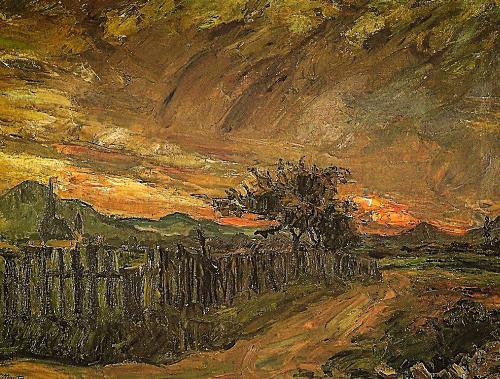
Max Slevogt
d. September 20, 1932
_______________________
Pathfinder
James Womack
(....)
Snails cobbling the aloes.
Enough trees ahead to see no more than trees
Until you are at them, and they open.
You mount always, over the valley:
A mudslip has slid a V from the other hillside.
A moth closes sticky and tight to a sycamore seed.
Not trackless, there are too many paths
Through the shade, dead footsteps on the needles
The air claggy, a thin river runs past
Without stopping. Climb higher among the trees
Lean against any one for solid help.
And her bones were turned to branches.
...(more)
wolf magazine
_______________________

Hans Hartung
b. September 21, 1904
_______________________
philosophy of captivity
Lori Gruen interviewed by Richard Marshall
3:am
Lori Gruen is a leading feminist philosopher who asks deep questions about the ethics of captivity, ethics, animals and what we’re doing to nature. She thinks that human exceptionalism is a prejudice, that considering marginal cases helpful in seeing why, is skeptical about intuitions about far fetched cases digging up important ethical insights, that two big issues concerning ethics and animals are captivity and industrial animal agriculture, thinks ecotourism is complicated, has problems with holisic approaches to environmental ethics, thinks women have it tough, that the ethics of captivity are both complex and have had little philosophical treatment, that self-direction matters when considering how we treat animals, that ideas of a wild free of human management is unrealistic, and that some captivity is necessary. It’s not dark yet, but it’s getting there…
(....)LG: The ethical issues around captivity are remarkably complex and it is surprising how little philosophical attention has been paid to them. You are right to think that prisons and zoos raise the most obvious issues –the individuals that are held captive in these environments are there against their wills, they endure a wide variety of restrictions on their liberty, and they are under the control of their captors. But when we describe captivity as a condition in which a competent adult is confined and controlled and is reliant on those in control to satisfy her basic needs, it becomes clearer that there are many captive environments beyond prisons and zoos, environments that are not ordinarily thought of in those terms.
...(more)
_______________________
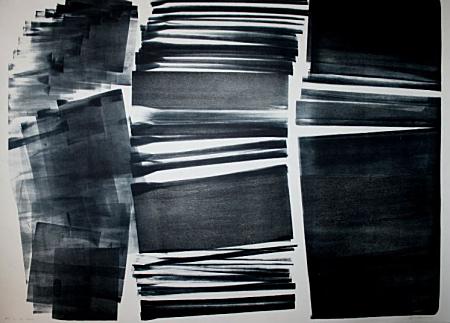
Hans Hartung
_______________________
Sissi Tax
translation by Joel Scott
madhatters review
dust
yeah, that’s it, what I, had I been able to write, how I would have wanted, will have written.
in order to finally come to dust. to that dust, at whose feet the universe that produces it lies, and which belongs to the favourite substances of the head of the household of the universe.
on these grounds it lies, the dust, around. it lies around multilayered in its clutterkammers, in their wunderkammers. dust-covered, dust-penetrated. mind-index-box, mind-index-box-fugues, -scoring, -clefts. it lies around multilayered, on the grounds of the universe in polymorphous amphibian-formations. dust-hairball, amphibian-like. pulverised, atomised. dust-dry dust-curves, dust-direct dust-ellipses. rigorous dust-tendencies, rigid dust-dilemmas, excellent dust-orders, hypertrophic dust-engorgements, xenophobic dust-stew, eminent dust-dams, extraordinary dust-columns, grandiose dust-buildups, sublime dust-furrows, prospective dust-aisles, gigantic dust-encrustments, heretic dust-drift, illusory dust-disaster, proselytic dust-uplifts, delicate dust-wear, robust dust-works, illusionistic dust-pyre, realistic dust-combats, mimetic dust-crusts, inompatible dust-cataracts, pompous dust-facts, grave dust-catcher, depressed dust-frond, shagreened dust-means, lamentable dust-article, idiosyncratic dust-discourses, opulent dust-palaver, crude dust-cadaver, anamorphic dust-recepticle, frugal dust-crumbs, orthographic dust-outbursts, objective dust-moboutbreaks, illuminated dust-slaughters, genuine dust-shred, transcendental dust-pains, nervous dust-corners, sapphic dust-tunes, immense dust-tragedies, centrifugal dust-riots, imaginary dust-mycelia, crumbed dust-hells, parodic dust-burials.
yeah, it lies like that, around, the dust. it lingers around. simple and indeed ordinary. dust offers just such a many-layered, manifold, and many-meaning performative persepective. in the deep-down and wide-ranging realms of the universe. in all of its pomp and ceremony and formidableness. and not only the prosodic dust-burials, the sapphic dust-tunes, the immense dust-tragedies as well as the idiosyncratic dust-discourses, but also all these diverse and divergent dust-facts throw up explicitly and articulately, exciting questions of dust-style.
...(more)
MadHat 14 Special Translation Issue
cut.ting edge: austrian, german and swiss writing
_______________________

Leonard Cohen
b. September 21, 1934
First Listen: Leonard Cohen, 'Popular Problems'
free streaming - npr

photo - mw
_______________________
Robert Kelly: An Alchemical Journal (10)
(....)
Most things can be done without machines. Enough suitably intricate vacant circuitry is available inside us to obviate external mechanisms. The adjusters of these circuits are called angels, the program tapes fed in are called reality, or time. Whoever the programmer may be, he or they or she are anxiously awaiting the outcome of each run. Alchemy is the science of becoming aware of the whole project in which we are being engaged. Alchemy is the science of being used. Alchemy is the science of use. Its name probably means the art of the black, & alludes in all likelihood not to the black soil of Egypt but to the black blankness of the unknown brain, the silent areas’ in which the Operator, bent night & day over his fire, eventually kindles a Voice, one that guides him in the science of penetration, science of final separations.
...(more)
_______________________
The lawn of genre: Wittgenstein Jr by Lars Iyer
Steve Mitchelmore
This Space
(....)
All of England was once a lawn, Wittgenstein says. The whole of the country, with its uplands and lowlands, with its suburbs and towns, was once the quintessence of lawn. [...]
And it was in the name of the English lawn that the enemy within was kept down, Wittgenstein says. The Peasants' Revolt was crushed for seeking equality on the English lawn. The Diggers were transported for declaring that the English lawn was part of the commons. [...]
But never was the English lawn so lush as in the great universities of England! Wittgenstein says. Old expanses of lawn, strewn with meadowsweet and buttercups in high summer. Crocuses blooming in spring. (....)
Wittgenstein Jr comes to an end as the carefree life of a student comes to an end. Salvation of a sort is offered to Wittgenstein Jr, but he disappears. A clue to his whereabouts was seen earlier when students go to his room to check on his well-being and spy scraps of paper tacked to the wall with only one word visible: APERION, Anaximander's word for the eternal or cosmological infinity (also spelled "apeiron" but this is how it appears in the novel). Perhaps this is an additional mark of excess to the one Derrida says signifies the participation in a genre without membership, a mark that is itself not part of the genre yet necessary for its distinction and recognition. Aperion then is the mark of a universal principle of existence, an abstraction outside of life that nevertheless makes life possible and is apparently sensible only in the light of a particular afternoon and in the freedom, lightness and excess of writing, and yet which, as Fischer's cavil confirms, must also succumb to the ever-encroaching English lawn.
...(more)
_______________________
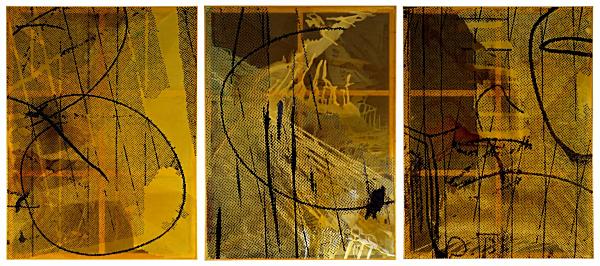 Alibis: Sigmar Polke 1963–2010
Tate Modern: Exhibition
Tate Etc. issue 32 (Autumn 2014) _______________________
The Wheel Turns, the Boat Rocks, the Sea Rises
Rebecca Solnit
There have undoubtedly been stable periods in human history, but you and your parents, grandparents, and great-grandparents never lived through one, and neither will any children or grandchildren you may have or come to have. Everything has been changing continuously, profoundly—from the role of women to the nature of agriculture. For the past couple of hundred years, change has been accelerating in both magnificent and nightmarish ways.
Yet when we argue for change, notably changing our ways in response to climate change, we’re arguing against people who claim we’re disrupting a stable system. They insist that we’re rocking the boat unnecessarily.
I say: rock that boat. It’s a lifeboat; maybe the people in it will wake up and start rowing. Those who think they’re hanging onto a stable order are actually clinging to the wreckage of the old order, a ship already sinking, that we need to leave behind.
(....)
If you want to know how potentially powerful you are, ask your enemies. The misogynists who are trying to sabotage, delegitimize, and silence feminism and feminists only demonstrate in a roundabout way that feminism really is changing the world; they are the furious backlash and so the proof of that change. The climate movement is similarly upsetting a lot of powerful people and institutions; to grasp that, you just have to look at the tsunamis of money spent opposing specific measures and misinforming the public. The carbon barons are demonstrating that we could change the world and that they don’t want us to.
(....)
Right now, we are in a churning sea of change, of climate change, of subtle changes in everyday life, of powerful efforts by elites to serve themselves and damn the rest of us, and of increasingly powerful activist and social-movement campaigns to make a world that benefits more beings, human and otherwise, in the longer term. Every choice you make aligns you with one set of these forces or another. That includes doing nothing, which means aligning yourself with the worst of the status quo dragging us down in that ocean of carbon and consumption....(more)
_______________________

photo - mw
_______________________
Against Animal Authenticity, Against the Forced March of the Now:
a review of Nicole Shukin’s Animal Capital
Karl Steel
elecronic book review
(....)
In the newest version of this old spiritual, humanist fantasy, capitalism imagines that the Internet and digital finance free it from factories, machines, heavy products, and, especially, workers, mostly now just consumers, as production goes on somewhere else in places not quite caught up to the fully human present. In this new present, power comes from the wind and sun, not steam and coal, while light transmits words and images effortlessly, without the strainings and sortings of printers and ink and scribes. When the animal rendering of the first (dis)assembly lines gives way to the portability and omnipresence of digital rendering, when stationary peasants give way to migrants, the soul of capitalism ascends from its dull carapace into a celestial glory infusing everyone fortunate enough to live in the true present.
Nicole Shukin’s Animal Capital interrupts these contradictory fantasies: on the one hand, capitalism’s self-serving fantasy of an animal/animated capitalism that thoughtlessly and mechanically “knows best,” and on the other, capitalism’s purported abolishment of a presumptively bestial corporeality into a realm of pure, digital spirit. The first fantasy process “renders” life into being capitalism itself, while also rendering animal bodies into products, like film stock, one of Shukin’s key examples, and also the animals of advertising. The second “renders” animals in the sense of digital rendering, or so it thinks, by turning away from physical stuff towards the purely spectral existence of finance and discourse. Shukin’s book frustrates all these processes of rendering, by emphasizing alternately either the cultural existence of animals, to combat the notion of an inert, predisursive natural existence, or the corporal character of capitalism, which cannot be abandoned, whatever its dreams of escaping animality to become pure culture.
(....)
In a larger sense, critical animal theory, as a “new thing” in criticism is, arguably, just another product, and, like all products, its time has already slipped away, almost from the moment of its introduction, in favor of still newer critical modes like critical plant studies and object-oriented ontologies, whose pieties claim to outdo anything else to date in their sensitivity to the wholly other. The delight in reviewing a book from 2009, five years on, is that of refusing the market’s demand always to be of the moment. The past, whether medieval or more recent, has its resources. It offers us a way to stop the smooth flow of capitalist time. And with Shukin, we must aim to be as adaptive as capitalism itself, always seeking some “counterhegemonic” (one of her favored words) purchase to whittle away at its fantasies and satisfactions, always looking for some way to get off the clock and to live on terms and in times other than what capitalism sells back to us, without ever imagining that we have got free of our obligations to our animal selves. ...(more)
Karl Steel’s How To Make A Human: Animals and Violence in the Middle Ages
Nicole Shukin electronic book review
(....)
The critical core of Steel’s book lies in his radical proposal that “the human is an effect rather than a cause of its domination of animals; that the human cannot abandon the subjugation of the animal without abandoning itself; and that the human can therefore be said not to exist except in its action of domination”. He argues, moreover, that because the human is contingently constituted rather than natural or given, the violence which founds the human needs to be incessantly reenacted. Steel explicitly extends Judith Butler’s understanding of identity as a performative recitation to the category of the human when he proposes that because “the human never comes completely into being, it is always trying to justify itself …. [T]he supposedly foundational act of the human can never cease, since it can never be founded on anything but the act itself”.
(....)
...Steel’s book participates in an exciting movement to “bring medieval studies into mutually beneficial critical relations with scholars working on a diverse array of post-medieval subjects, including critical philosophies that remain un- or under-historicized”. Such critical philosophies include posthumanisms and new materialisms of various stripes, affect, thing, and object oriented theory, ecocriticism and critical animal theory, and theories of sovereignty and biopower. Steel’s book certainly brings the Middle Ages into intimate relationship with contemporary critical philosophies, particularly those philosophies devoted to deconstructing the sovereignty of the human and elaborating an ethics of co-constitution and co-existence. ...(more)
_______________________

Joseph Mallord William Turner
Peace - Burial at Sea
Madman or Master?
The EY Exhibition: Late Turner - Painting Set Free
_______________________
David Shook translating Mikeas Sánchez
Those who sleep beyond day and night
beyond solitude and abandonment
dream of life
and are scared to live
who doesn’t it scare?
And those of us who are awake
we who live through absence
from the solitude of smiles
we who die each instant
and console ourselves by filling emptiness
with the joy of bodies
equally empty
we also dream of living
inhabiting sillhouetes
escaping fright
...(more)
Translation
Drunken Boat Issue 19

Port Franks
photo - mw
_______________________
Reception & Effusion: fragments on asemic objects, after Ponge
Kit Schluter
Entropy
There is one activity can always engage in: the gaze-of-such-a-sort-that-it’s-spoken, the comment upon what surrounds him and upon his own state amidst what surrounds him. Right away, this lets him recognize the importance of each thing and its mute supplication, the instances when, in their silence, they make us speak them, according to their value, and in themselves,—outside of their habitual signifying value,—with no alternative, and yet measured. By what measure?: their very own.
– Francis Ponge, “Les Façons du regard” [Ways of Seeing]i
I swear language is capable of getting in the way of my use of it.
Sometimes I can’t bear the effects of its having a mind of its own . . . !
*
To hold a pebble in your palm once is to understand how every pebble behaves,
how every pebble has ever behaved (since well before the flood,)
is to understand that a pebble wouldn’t move, or couldn’t move,—
that a pebble shouldn’t move,—
unless acted upon by an external force (to quote a phrase),
is to feel that a pebble has no force,
but has been brought by what it is not to where it has come to rest—
inertly.
*
Ponge: “It is sometimes the case that the stone itself holds signs of having been stirred. In its final stages, as pebble, gravel, sand, dust, it is no longer able to play its role as bearer or supporter of animate things.”ii
Is this what it means to be without will:
“inanimacy,”
moving only passively through the space on the side of things,
being moved, breaking down, until there is nothing left but pebble, gravel, sand, dust,
until there is not enough left of you to even house or support your suppressors, the ones who caused
you to stir, to disintegrate?
And does a stone continue to possess its body as it falls away to pebble, grave, sand, dust?
And is there even such thing as totality in geology, or has all that was once integral broken into discrete bodies? A sort of incomplete whole.
And to what whole, beyond the pebble itself, could the pebble belong?
...(more)
_______________________

photo - mw
_______________________
Sky High, Skin Deep
dark technologies of mediation
Renata Lemos Morais
ctheory
(....)
What I propose in this article is a theoretical approach to processes of mediation that are not visual. I address unattainable and invisible processes of technological mediation in which mediation itself becomes, parallel to the overabounding surrounding excess of visual percepts, a form of inaccessibility that in its totality becomes unfathomable. Such understanding of mediation goes against simplistic notions that reduce its meaning to "that which makes communication accessible."
Not every instance of mediation can be easily accessed in a world of pervasive media. Dark technologies of media, which range from drone-mediated to nano-mediated networks, lead to partial and absolute degrees of inaccessibility. Pervasive media produces two different realms of non-access: informational and physical. Parallel to the informational obscurancies of dark data and drone-mediated surveillance, weird tales are told about the physical inaccessibility that is a property of nano levels of mediated matter. Dark mediation belongs to science-fact just as it belongs to science fiction. It pertains, simultaneously, to the combined material ecologies of culture, technology, and nature. Pervading data systems and matter itself, our dark technologies of mediation are hidden in plain sight.
Dark mediation presupposes different degrees of inaccessibility. It is, therefore, mediation that leads to partial or absolute noncommunication. This inaccessibility can belong to the realm of disappearance, in which we find the forbidden, the hidden, the forgotten--or it can belong to the absolute, the ethereal, the ontological. The materiality of media technologies and their technological dust are not only causing a lack of breath -- they are also creating a curtain of fog that obfuscates mediation.
...(more)
_______________________
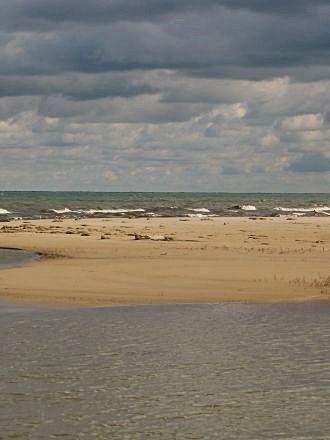
photo - mw
_______________________
The Cahiers Series: Center for Writers & Translators, The American University of Paris
Sarah Gerard
bomb
Translation as visitation. Translating silence, or the inability to translate silence. A word that does not want to be translated. Translation as story. Attempting to translate grief. Translation as unanswered letter to the dead. Translation as discovery, biography, or history. Invisible translator. Translation with seams, as weave, as warp or weft, as continuity via femininity. Translation as architecture, music, painting, or poetry. Translation as inevitable failure. Translation of the body, of text into movement or gesture. Translation as transportation, transformation, reformation, performance, puppetry. A translation scrambles the syntax of daily life.
Translation as conversation. The twenty-three pamphlets in The Cahiers Series echo each other, recombining as cells into a larger body, as, “An instant / translation of / what was splitting / into cells / or wasn't” (from Idra Novey's Clarice: The Visitor, the most recent cahier). Or as Anne Carson in Nay Rather, #21, seems to be saying to Isabella Ducrot (Text on Textile, #6): “My white paint is your broken weft of Penelope.” The series makes a story that does not want to be linear, as if rearranged by Carson's random number generator in “By Chance the Cycladic People.” It asks: Does translation spring forth from an inalienable desire to retrace our many steps to the source, to before-language—to the story as it is so many stories before they become text—so as to rediscover, each of us, our own individual paths back to language?
...(more)
BOMB 129, Fall 2014
|
